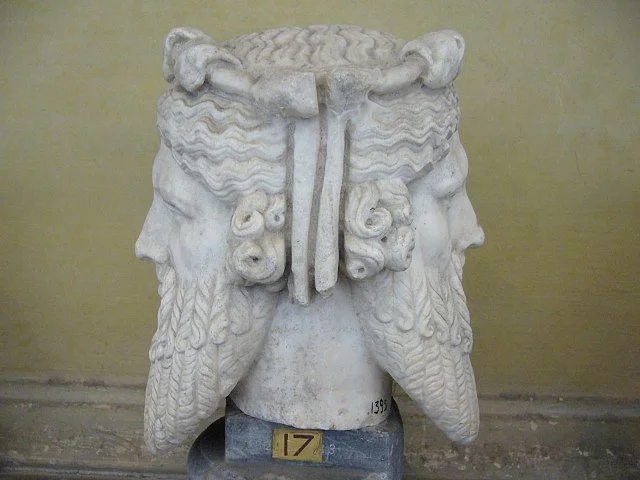In ancient times, Janus was a god of beginnings and endings. He also represented the year's transitions from one season to another. In modern times, we recognize him as the god of doors and gates. He is depicted in art with two faces looking in opposite directions - one facing forward and one facing back."
Who is Janus?
Janus is the Roman god of transitions, time, duality, beginnings, and endings. In addition, he presided over conflicts and war and peace, birth, and journeys.
If you are in sales, a trucker, or other professions where you travel for work then Janus is a good God to honor at the beginning or end of your day.
Some consider Janus to be the first priest and the Father of Divination. Titles he earned by his ability to see the past and look into the future.
Fun Fact: We often think the month January is named after the God Janus when in fact, according to Roman almanacs, it is named after the Goddess Juno.
Why Does Janus Have Two Faces?
Janus is portrayed with two faces. One is facing the past, and one is facing the future.
In addition, Janus holds a key in his right hand as the god of doors, gates, thresholds, and any opening between spatial boundaries. These can be real or metaphysical boundaries.
Some renderings show him with two of the same faces. Others portray a younger face and an older face.
Position in the Pantheon?
While not a major God he was closely linked with Jupiter. Janus was very important in the daily life of people.
Camese, Jana, and Juturna were the wives of Janus. Janus was the father of Tiberinus and Fontus.
Interestingly, Janus does not have a Greek counterpart. He is uniquely Roman. The Greeks had a mythical two-headed dog named Orthus. However, he was a monster, not a god, and was killed by Hercules.
Professor Donald Wasson states that it is possible that Janus actually did exist as a human man. According to legend, Janus immigrated from Greece to Rome where he ruled alongside an early Roman king named Camesus.
After Janus’ exile from Thessaly, he arrived in Rome with his wife Camise or Camasnea and children... He built a city on the west bank of the Tiber named Janiculum”.
What Temples are Dedicated to Janus?
There are several temples in the world that are dedicated to Janus. Some of these temples include the Porta Capena temple in Rome. The Temple of Janus Geminus was built 260 BCE in Rome after the Battle of Mylae. Neither of these temples is standing today.
How Can Janus Help Me Today?
As the God of changes and transitions, Junus should be a god you take time to worship.
Starting a new job or a business?
Giving birth or adopting a baby?
Moving or traveling?
Preparing for the next world?
Want to protect the doorway into your home?
Janus can help you in any magic that helps you with new beginnings as well as helping you escape from the burdens of your past.
Call upon Janus before doing divination practices.
Janus Altar
You can set up a dedicated altar for Janus if you have a big transition coming up or you can set aside part of your daily altar for Janus.
Janus appreciates offerings of dried bay laurel leaves for incense, roasted lamb, pickled capers, wine, and pastries.
Greet the morning by honoring Janus. Make an offering of a pastry or roll and say…“Janus, I lift this food to you and put myself in your hands. I honor you at the beginning of this day and ask that you may favor me, my children, and our home.” Or something that meets your current needs.
How Do We Celebrate Janus Today?
There are many ways to celebrate Janus today.
One common way is to keep a coin in your pocket so that you can give it to someone when you cross paths with them. This tradition symbolizes the wish for good luck from Janus.
Happy New Year
We often celebrate Janus on New Years Day. Janus does after all symbolize new beginnings. However, traditionally his holiday was on the Vernal Equinox.
It was a Roman tradition at the New Year to make an offering of honey, cakes, incense, and wine.
Another popular way to celebrate Janus is to eat a bowl of lentils on New Year's Day. This tradition symbolizes how life begins anew in the new year and also represents prosperity for the coming months ahead.
Romans did not take off from work on this holiday because they felt it demonstrated laziness and was a bad omen for the start of the year.
Author, Ame likes to joke that she is 1/2 pagan and 1/2 Catholic due to her Native (Cree) and Italian heritage. She is a lifelong pagan, an environmental educator, and a licensed wildlife rehabilitator. Ame writes about honoring nature, animal spirit guides, crystals, and holidays. She also does our social media pages. Check us out on Facebook and Twitter.






Traditionally pagans have celebrated life’s journey with rites of passage. The joining of two people in marriage is one of those passages. Today’s pagans want a wedding that reflects their values.